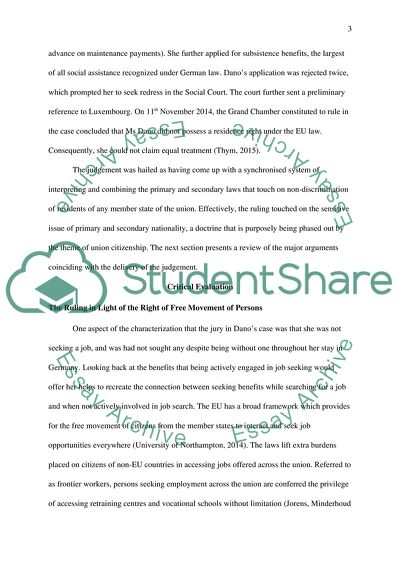Cite this document
(The Judgement of the Case of Dano Versus Jobcenter Leipzig Report, n.d.)
The Judgement of the Case of Dano Versus Jobcenter Leipzig Report. https://studentshare.org/law/1870317-critically-evaluate-the-judgment-of-the-cjeu-in-case-c-33313-elisabeta-dano-floin-dano-v-jobcenter-leipzig-in-the-light-of-the-right-of-free-movement-of-persons-and-the-concept-of-eu-citizenship-on-the-one-hand-and-accusations-of-welfare-tourism-on-the
The Judgement of the Case of Dano Versus Jobcenter Leipzig Report. https://studentshare.org/law/1870317-critically-evaluate-the-judgment-of-the-cjeu-in-case-c-33313-elisabeta-dano-floin-dano-v-jobcenter-leipzig-in-the-light-of-the-right-of-free-movement-of-persons-and-the-concept-of-eu-citizenship-on-the-one-hand-and-accusations-of-welfare-tourism-on-the
(The Judgement of the Case of Dano Versus Jobcenter Leipzig Report)
The Judgement of the Case of Dano Versus Jobcenter Leipzig Report. https://studentshare.org/law/1870317-critically-evaluate-the-judgment-of-the-cjeu-in-case-c-33313-elisabeta-dano-floin-dano-v-jobcenter-leipzig-in-the-light-of-the-right-of-free-movement-of-persons-and-the-concept-of-eu-citizenship-on-the-one-hand-and-accusations-of-welfare-tourism-on-the.
The Judgement of the Case of Dano Versus Jobcenter Leipzig Report. https://studentshare.org/law/1870317-critically-evaluate-the-judgment-of-the-cjeu-in-case-c-33313-elisabeta-dano-floin-dano-v-jobcenter-leipzig-in-the-light-of-the-right-of-free-movement-of-persons-and-the-concept-of-eu-citizenship-on-the-one-hand-and-accusations-of-welfare-tourism-on-the.
“The Judgement of the Case of Dano Versus Jobcenter Leipzig Report”. https://studentshare.org/law/1870317-critically-evaluate-the-judgment-of-the-cjeu-in-case-c-33313-elisabeta-dano-floin-dano-v-jobcenter-leipzig-in-the-light-of-the-right-of-free-movement-of-persons-and-the-concept-of-eu-citizenship-on-the-one-hand-and-accusations-of-welfare-tourism-on-the.


